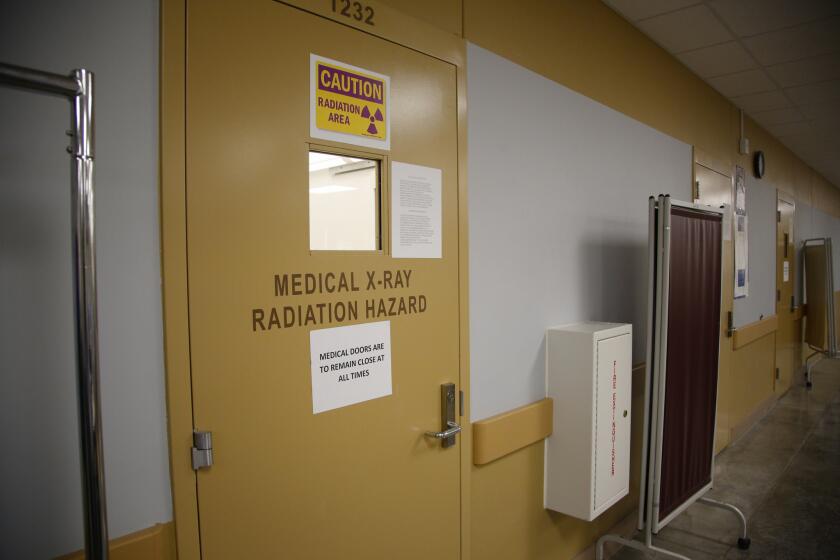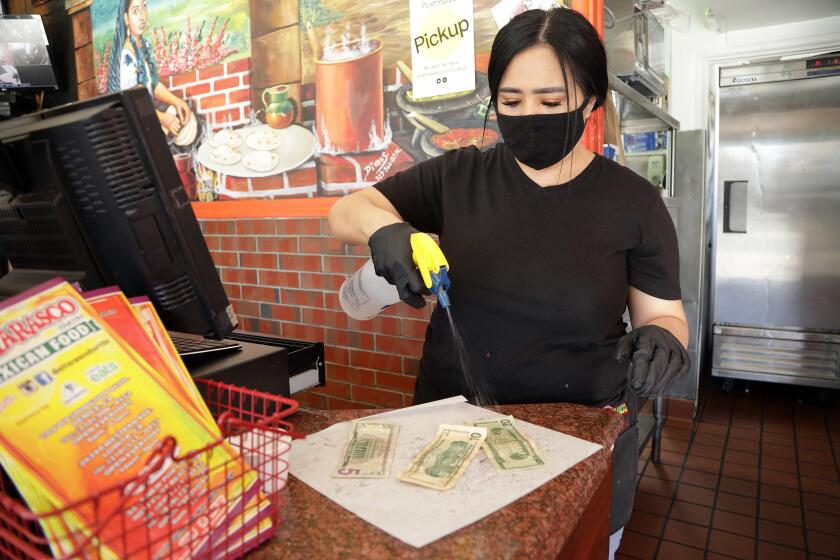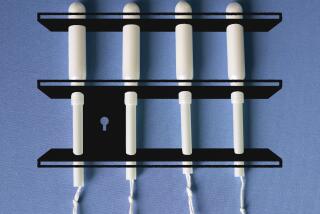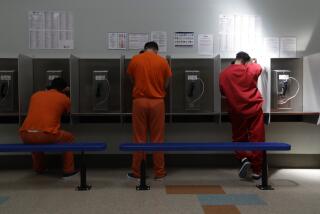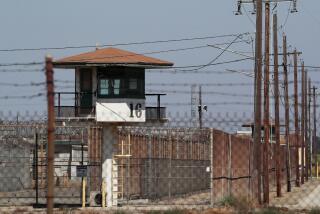Detainees at Otay Mesa Detention Center were offered masks, but only if they signed contracts
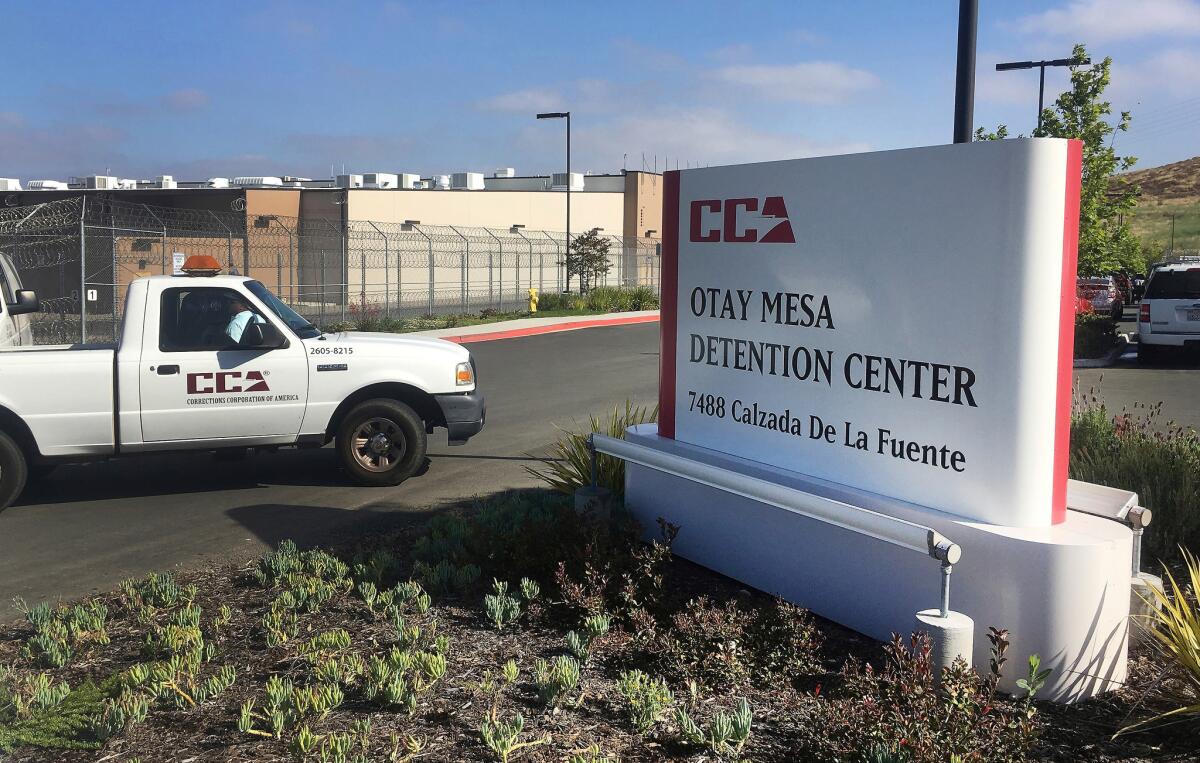
- Share via
San Diego — Detainees at Otay Mesa Detention Center had been asking for more protection from the COVID-19 pandemic all week, when a shipment of surgical masks arrived at the facility on Friday.
The women of “A pod” would finally be able to ditch their own constructions made from rubber bands, panty liners and cut-up shirts for proper masks.
But by that afternoon, the mood quickly changed from excitement to anger, said Briseida Salazar, a 23-year-old in the unit, which houses immigration detainees.
Tensions had already been high inside the facility — a mix of immigration detainees and criminally charged inmates — since the first person, a facility employee, tested positive last week.
At least six ICE detainees and five facility employees at the Otay Mesa Detention Center have tested positive for the infection
At least 16 detainees — 12 in the custody of Immigration and Customs Enforcement and four under U.S. Marshals Service supervision — have tested positive for COVID-19 as of Friday afternoon, according to a facility document obtained by the San Diego Union-Tribune.
One woman in the A pod is among those who tested positive.
Detainees had complained of not having protective gear such as masks and gloves and not having adequate soap.
“We’ve been closely following Centers for Disease Control and Prevention recommendations since the beginning of the COVID-19 pandemic,” said Amanda Gilchrist, spokeswoman for CoreCivic, the private company that runs the detention center. “The CDC’s guidance on the use of masks has recently changed, and we’ve worked hard to quickly ensure that all of our staff and those in our care have access to masks consistent with this new guidance.”
The new surgical masks arrived Friday, but they initially came with conditions, Salazar said.
Salazar’s account of what happened when the masks arrived is corroborated by a signed declaration from San Diego attorney Anna Hysell, whose client called her immediately after it happened, as well as messages from other attorneys who heard similar stories from their clients.
Before the masks were to be distributed, the unit manager handed the women contracts written in English, telling them they would have to sign in order to get masks.
Most of the women in the unit do not speak English, Salazar said. Having grown up in the United States, she is one of the few who do.
The document, as read over the phone to the Union-Tribune, included a section saying that detainees agree to “hold harmless” CoreCivic and its agents and employees “from any and all claims that I may have related directly to my wearing the face mask.”
When the unit manager began to verbally translate the document into Spanish, one of the bilingual detainees noticed that she skipped the “hold harmless” section in her translation. She pointed that out to the other detainees, and they became angry.
Most refused to sign, noting that they should be given forms in their own languages. Some in the pod speak neither English nor Spanish.
The unit manager reiterated that they would not be given masks without signing, Salazar said.
The detainees became noisy as their anger increased. Salazar said she wanted to be protected, but she didn’t want to sign away her rights without understanding what she was signing or consulting with an attorney. She believes the other detainees felt the same way.
“We were upset. We were being loud,” Salazar said. “But we all were upset because she was not doing her job right. She wasn’t giving us the information that we needed.”
Los Angeles Times’ visual coverage of the coronavirus crisis
When the women demanded to be given masks, they were threatened with pepper spray, according to the multiple accounts.
Gilchrist, the CoreCivic spokeswoman, said there was no use of force at the detention center.
Three women, including the one who had recognized the translation error, were taken away.
“We all came out and said if they’re going to get punished, we’re all going to get punished,” Salazar said, her voice full of emotion.
The women decided to begin a hunger strike that would not end until the three women were returned.
Hysell soon received a call from her client.
“My client began to cry and tell me that she is very scared,” Hysell said in her statement, which she plans to file in connection with a legal case. “She said that the facility is not adequately protecting them.”
Hysell added that her client has said that the unit does not have hand sanitizer, contrary to statements made by ICE officials about what has been provided to detainees during the pandemic.
ICE’s deputy medical director, Dr. Philip Farabaugh, said in a court filing that soap and hand sanitizer are available in all units at Otay Mesa.
ICE has said more generally in a statement on its website that soap is available to detainees and hand sanitizer when possible.
CoreCivic said late Friday when asked about the incident in A pod that contracts would not be necessary for detainees to get masks.
“To make sure that anyone wearing a mask fully understands that they may not be preventative and that it’s important to continue measures like social distancing and proper hygiene recommendations, we will provide an educational handout,” Gilchrist said. “No signed waiver will be required to receive a mask.”
About five hours after the incident, CoreCivic staff gave out the masks and asked the women to initial a paper to acknowledge that they had received masks, Salazar said. The contracts were gone.
The three women who had been taken away were also brought back to the unit.
Morrissey writes for the San Diego Union-Tribune.
More to Read
Sign up for Essential California
The most important California stories and recommendations in your inbox every morning.
You may occasionally receive promotional content from the Los Angeles Times.
